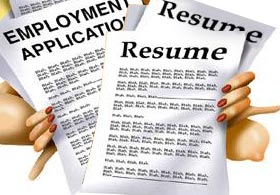

hat's a CV or resume?
It's simply an advertisement that helps you sell yourself to an employer.
It needs to present your skills and experience in the best possible light and emphasize your suitability and potential for the job.
That is why it is a good idea to spend time on preparing a targeted, effective, error-free document that will impress a potential employer.
Employers see a lot of CVs, so avoid imitating standard CV samples. You can score bonus points instead if your CV is just that little bit different and has your own personal stamp.
Some tips
- Always print your CV on a standard A4, plain white or pale coloured paper. Use matching envelopes.
- Always send a brief customised letter with any CV that you send out.
- Presentation is extremely important, so make sure your CV is typed or word-processed.
- It should be well laid out and printed on a good quality printer.
- Leave plenty of space between paragraphs and allow adequate margins.
- Use plain English. Avoid professional jargon.
- Keep paragraphs short -- preferably no longer than five or six lines.
- Your entire CV should not exceed two pages in length -- but if your breadth of experience merits it, you can justify a CV that runs to four pages.
- Use bold lettering and/or underline print for headings.
- Do not use lots of different font types and sizes. You are not designing a magazine cover!
- Use plenty of white space. Remember to leave a decent margin on all four sides of the page.
- Consider using 'bullets' to start sub-sections or lists.
- Use positive language and adopt a confident tone.
- Be careful with dates. Make sure every year is accounted for. Employers will get suspicious if they see too many gaps.
The main section of your CV
1. Personal details- Name
- Address
- Telephone/cellphone number/s (and e-mail)
- Date of birth
- Nationality
2. Education
- Details of your university education
- School
- Work-related training
3. Work experience
List past employment details in reverse chronological order, with the most recent first. Always reserve more space for your most recent or current position. Names of past employers, along with the date of appointment and the date you left, and a brief outline of responsibilities is essential. Some employers also like to see a brief description of the companies and a summary of their business.
Always include your specific contributions to each job, listing related responsibilities and achievements with each entry, rather than in a separate section.
List any affiliation to relevant professional associations.
4. Skills
Employers are often interested in specific skills you have acquired, such as
- Foreign languages
- Computing languages or packages
- Keyboard skills
- Driving ability
- Try to give specific details, for example, about your level of proficiency in foreign languages, degree of familiarity with computer packages, and so on.
5. Interests and activities
Do not just list your interests. Show how they have helped develop skills a potential employer will value.
6. References
For references, choose people who can comment on different aspects of your professional personality. Two references are usually enough. Only give three if there is another person whose opinion you feel your potential employer really needs to hear.
General tips
- It can be good to start with a personal profile/objective statement. This is a two or three sentence overview of your skills, qualities, hopes and plans. It should encourage the employer to read the rest. You could add a photo of yourself. Make sure it is a good one!
- You may vary the style according to the type of job. A big company would normally expect a formal CV on white paper. But a CV applying for a television production or graphics designer job could be less formal -- in such cases you can use coloured paper, unusual design, etc.
- Don't include the date the CV was prepared -- this will shorten its usefulness.
- Never state specific objectives. These are more effective when you include them in your covering letter.
- Check that both your CV and covering letter are completely free of errors. Spelling mistakes will definitely detract from your application. Proof read both documents thoroughly. Get a friend to proof read them as well.
- Keep an ongoing file of your achievements, no matter how insignificant they may appear -- one day they'll make the basis for a good CV.
- Remember to give each of the people you've mentioned a reference copy of your CV.
- Re-read your CV before any interview -- chances are the interviewer will too and you must know what's in it.
Abha Kapoor, the co-founder of K & J Search Consultants, a premier Mumbai placement agency, spoke to Sita Menon.





